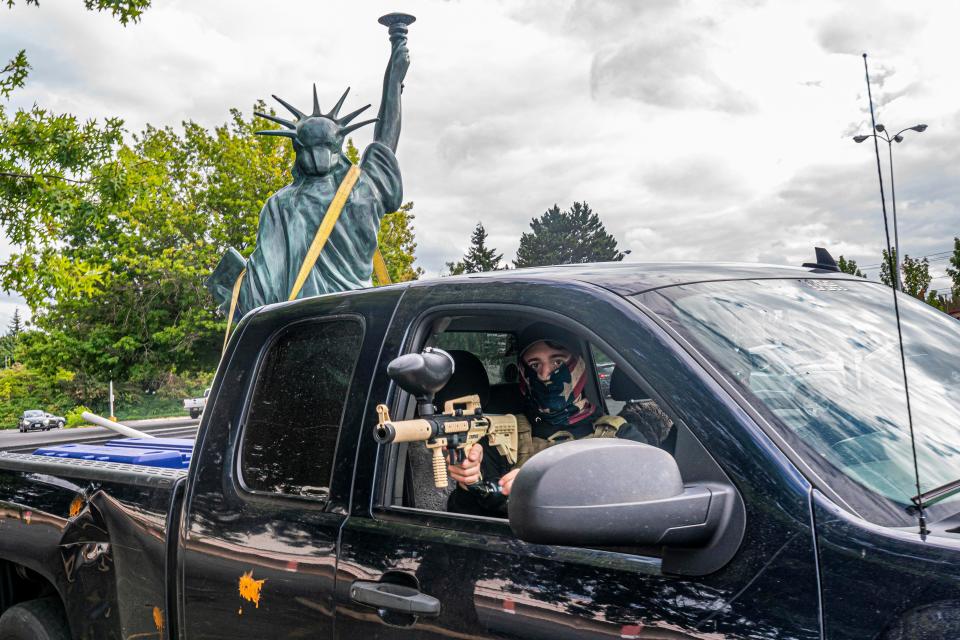With Trump in the rearview mirror, Proud Boys offer muscle at rallies against vaccine mandates, masks
- Oops!Something went wrong.Please try again later.
After lying low for months since the Capitol insurrection Jan. 6, members of the far-right street gang the Proud Boys have been showing up at protests against mask mandates and coronavirus vaccine requirements.
In recent weeks, Proud Boys have been spotted at rallies in at least five states. From Los Angeles to Columbus, Ohio, members have scrapped with counterprotesters after gathering for events branded as pro-freedom, pro-patriot or anti-COVID-19 restrictions.
They've even appeared at school board meetings to protest the teaching of "critical race theory," a controversy fanned by conservative activists and news media.
"They've been piggybacking on other people's events," said Jared Holt, a fellow at the Atlantic Council's Digital Forensic Research Lab. "They go where they believe the culture war is being fought, because they see themselves as potentially violent enforcers in a broader culture war."
One man's journey into the Proud Boys: They joined the Wisconsin Proud Boys looking for brotherhood. They found racism, bullying and antisemitism.
Conspiracy charges against Proud Boys: Capitol riot spurred conspiracy charge against 31 suspects, but how hard is it to prove?
Anti-mask protests become violent
Throughout August, members of the Proud Boys attended protests against COVID-19 restrictions in California, Oregon, Ohio, South Carolina and Kentucky. Some of those events became violent.
On Aug. 14 in Los Angeles, a group of Proud Boys and other far-right agitators attacked counterprotesters and journalists outside City Hall. Frank Stoltze, a veteran reporter for LAist, was shoved and kicked by men in the crowd.
Though members of the mob weren't dressed in the Proud Boys' signature gold and black colors, activists identified several of the men as members of the extremist group.
Videos from the protest show members of the crowd chanting "Uhuru," a Proud Boys slogan. Some wore orange armbands and carried orange water bottles, the same color that Proud Boys used during the insurrection Jan. 6 to help identify one another.

A week earlier in Portland, Oregon, members of the Proud Boys attended an event supporting Sean Feucht, a conservative pastor who has railed against vaccines and held concerts at which the audience is encouraged not to wear masks.
The evening ended with Proud Boys brawling with anti-fascists in downtown Portland.
In other cities, including Frankfort, Kentucky, Proud Boys simply flashed white power signs and shouted the occasional slur at photographers and reporters.
Far-right 'security guards'
From its inception in 2016, it's never been quite clear what the Proud Boys stand for, what they want, or what they hope to achieve.
The group rallied around President Donald Trump when he was in office. Chapters found a niche acting as security guards at GOP rallies and other public events, sometimes at the invitation of politicians.
The group, which has associations with white supremacists, got more exposure when Trump told it to "stand back and stand by" during a presidential debate in September.
At least 29 people associated with the Proud Boys are among the more than 500 arrested in connection with the insurrection Jan. 6 when a mob angry about Trump's loss in the presidential election invaded the Capitol.
Without Trump to rally behind, and as their chairman heads to prison this month after pleading guilty to destruction of property and weapons charges, the Proud Boys have been left rather rudderless, said Samantha Kutner, a fellow at the Khalifa Ihler Institute who has studied the group for years.

The Proud Boys gravitate toward public protests and causes that will get them the attention and notoriety they crave, Kutner said.
"It's part opportunistic, but it's also a reflection of the conspiratorial worldview that they're embracing and have embraced through the 'red pill' movement," Kutner said, using a term popular on the far-right to describe someone awakening to agree with extremist ideologies.
"They're a reactionary movement," she said. "They haven't really thought things out, but they will seize opportunities where they can."
Daryle Lamont Jenkins, an activist and founder of One People's Project who has been tracking the far-right for decades, said the Proud Boys embraced the idea that they're a security service for any group that might raise the ire of anti-fascists.
"The first time I ever came across the Proud Boys, they were doing security for Milo Yiannopoulos, and that was back in 2017," Jenkins said. "The far-right definitely sees them as their security."
Glomming onto new causes
The Proud Boys' support for the anti-mask and anti-vaccine movement is their latest attempt to attach themselves to far-right causes, several experts said.
Kutner said that in 2019, Proud Boys in Canada, where the government has officially declared the group a terrorist entity, marched in support of the "Yellow Vests" movement – a hodgepodge of largely far-right activists.
This year, Proud Boys showed up at school board meetings to decry the teaching of "critical race theory," or CRT, in schools. Most schools don't actually teach critical race theory, but many teachers incorporate historical narratives from oppressed people and cultures – which education and history scholars say is a good thing.
Shouting matches, arrests and fed up parents: How school board meetings became ground zero in politics
Kutner said most of the Proud Boys have little idea what they're protesting.
"CRT has become synonymous with anything the boogeyman wants, like communism for example," she said. "But if you ask the average Proud Boy, 'What is critical race theory?' everyone will give you a different answer because they don't actually know."
Contributing: Erin Richards, Ryan Miller
This article originally appeared on USA TODAY: Proud Boys join protests against COVID-19 vaccine mandates, masks

